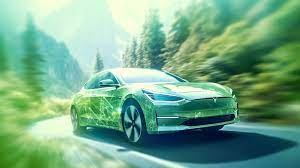Driving Toward Sustainability: Exploring the Environmental Benefits of Electric EVs
by siteadmin

With growing concerns about climate change and air pollution, the automotive industry is undergoing a transformative shift toward electric vehicles (EVs) as a cleaner and more sustainable mode of transportation. Electric EV offer numerous environmental benefits compared to traditional internal combustion engine vehicles, making them a key solution in the fight against climate change and environmental degradation. In this blog post, we’ll delve into the environmental benefits of electric EVs and highlight their positive impact on the planet.
Reduction in Greenhouse Gas Emissions:
- One of the most significant environmental benefits of electric EVs is their ability to reduce greenhouse gas emissions. Unlike conventional gasoline-powered vehicles, which emit carbon dioxide (CO2) and other harmful pollutants during combustion, electric EVs produce zero tailpipe emissions when powered by electricity.
- By transitioning to electric EVs, drivers can significantly reduce their carbon footprint and contribute to mitigating climate change. According to studies, electric EVs produce fewer emissions over their lifecycle, even when accounting for the emissions associated with electricity generation.
Improvement in Air Quality:
- Electric EVs offer tangible benefits for air quality, particularly in urban areas where air pollution poses a significant health risk. By eliminating tailpipe emissions of harmful pollutants such as nitrogen oxides (NOx), particulate matter (PM), and volatile organic compounds (VOCs), electric EVs help improve local air quality and reduce the prevalence of respiratory illnesses and cardiovascular diseases.
- Studies have shown that widespread adoption of electric EVs can lead to substantial reductions in air pollution-related health impacts and healthcare costs, benefiting both human health and the environment.
Renewable Energy Integration:
- Electric EVs provide an opportunity to integrate renewable energy sources, such as solar and wind power, into the transportation sector. By charging EVs with electricity generated from renewable sources, drivers can further reduce their environmental impact and support the transition to a clean energy economy.
- Renewable energy-powered EVs offer a sustainable and low-carbon transportation solution, reducing dependence on fossil fuels and promoting energy independence.
Conservation of Natural Resources:
- Electric EVs are more efficient than traditional internal combustion engine vehicles, requiring fewer natural resources for operation. EVs typically have higher energy efficiency ratings and consume less energy per mile traveled, reducing the overall demand for fossil fuels and raw materials.
- Additionally, electric EVs do not require the extraction and processing of petroleum-based fuels, which can have significant environmental impacts, including habitat destruction, water pollution, and biodiversity loss.
Noise Pollution Reduction:
- In addition to their environmental benefits, electric EVs contribute to reducing noise pollution in urban environments. Unlike conventional vehicles with internal combustion engines, which produce engine noise and exhaust sounds, electric EVs operate quietly and produce minimal noise during operation.
- The reduction in noise pollution from electric EVs can improve the quality of life for residents in densely populated areas, enhancing the overall urban environment and promoting a more tranquil and peaceful living environment.
Electric EVs offer a compelling solution to address environmental challenges and promote sustainability in the transportation sector. With their ability to reduce greenhouse gas emissions, improve air quality, integrate renewable energy, conserve natural resources, and mitigate noise pollution, electric EVs play a crucial role in advancing a cleaner, greener, and more sustainable future. By transitioning to electric EVs, drivers can contribute to protecting the planet, preserving natural resources, and creating healthier and more livable communities for generations to come.
With growing concerns about climate change and air pollution, the automotive industry is undergoing a transformative shift toward electric vehicles (EVs) as a cleaner and more sustainable mode of transportation. Electric EV offer numerous environmental benefits compared to traditional internal combustion engine vehicles, making them a key solution in the fight against climate change and…
Recent Posts
- Abilene Electricians: Setting the Standard for Excellence in Electrical Services
- Abilene Electricians: Setting the Standard for Excellence in Electrical Services
- Eco-Friendly Power: How Solar Panels Are Changing the Game in NT
- Eco-Friendly Power: How Solar Panels Are Changing the Game in NT
- Driving the Future: Exploring the Advancements in Electric EV Technology
